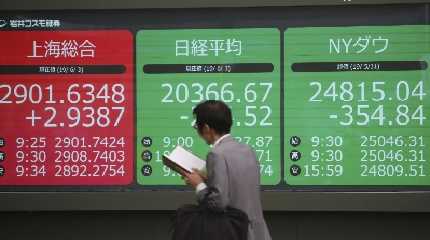
BEIJING (AP) — Asian stock markets tumbled by unusually wide margins Thursday after the Federal Reserve indicated it plans to start raising interest rates soon to cool inflation.
Tokyo’s market benchmark fell more than 3%. Hong Kong and Seoul lost more than 2%.
Wall Street’s benchmark S&P 500 index lost 0.1% on Wednesday after a Fed statement said the U.S. central bank “expects it will soon be appropriate” to raise rates. Investors expect as many as four rate hikes this year, starting in March. The Fed said monthly bond purchases that push down long-term rates by injecting money into the financial system would be phased out in March.
“The Fed’s decision will reverberate globally, meaning that the era of low interest rate, ultra-low interest rate is over,” said Francis Lun, CEO of Geo Securities in Hong Kong. “All the central banks will start to fight inflation instead of trying to stimulate the economy.”
The Nikkei 225 in Tokyo fell 3.2% to 26,152.12 and the Hang Seng in Hong Kong retreated 2.6% to 23,664.80.
The Kospi in Seoul sank 2.9% to 2,630.78 after a stunning market debut for battery maker LG Energy Solutions, whose shares opened at nearly twice their offer price of 300,000 won ($250) after an initial public offering that drew 13 trillion won (nearly $11 billion) in bids.
LG Energy was the world’s second largest maker of electric car batteries behind China’s CATL for the first 11 months of last year with about a 22% market share, according to South Korean market research firm, SNE Research. The strong outlook for electric vehicle sales enhanced the company’s appeal.
The company’s shares closed at 505,000 won ($420). The stock debut has made LG Energy the country’s second-most valuable company by market capitalization behind technology giant Samsung Electronics.
Samsung’s shares fell 2.1% Thursday after it reported its operating profit for the last quarter rose by more than 53% from the same period last year as it thrived during the pandemic while relying on its dual strength in parts and finished products.
The Shanghai Composite Index declined 0.9% to 3,425.28 and Sydney’s S&P-ASX 200 shed 2% to 6,822.10.
India’s Sensex opened down 1.8% at 56,809.30. New Zealand and Southeast Asian markets also declined.
On Wall Street, the S&P 500 slipped to 4,349.93 after being up 2.2% ahead of the Fed announcement.
The Dow Jones Industrial Average fell 0.4% to 34,168.09. The Nasdaq composite was little-changed at 13,542.12, shedding a 3.4% gain earlier in the day.
Wall Street rose immediately after the Fed statement but major indexes gave up their gains as Chair Jerome Powell took questions about how and when the central bank will let its balance sheet shrink after buying trillions of dollars of bonds through the pandemic. That would put upward pressure on market interest rates.
The selling accelerated as Powell acknowledged high inflation that has squeezed businesses and consumers isn’t getting better. That could force the Fed to get even more aggressive about raising rates and removing its support for markets.
The last time the Fed raised rates and shrank its balance sheet at the same time was in late 2018. The S&P 500 lost nearly 20%.
“Since the December meeting, I’d say the inflation situation is about the same but probably slightly worse,” Powell said. “It hasn’t gotten better. It’s probably gotten just a bit worse, and that’s been the pattern.”
Powell also said that there’s room to raise interest rates without hurting the labor market, and wouldn’t rule out the possibility that the Fed could raise short-term rates at any of its seven remaining meetings this year or opt for a larger-than-usual increase at any one of them.
The Fed’s near-zero interest rates helped to boost stock prices for nearly two years, but markets have been volatile since Powell and other officials in mid-December said plans to wind down economic stimulus might be accelerated to fight surging inflation.
In energy markets, benchmark U.S. crude lost 73 cents to $86.62 per barrel in electronic trading on the New York Mercantile Exchange. The contract rose $1.75 to $87.35 on Wednesday. Brent crude, the price basis for international oils, shed 72 cents to $88.02 per barrel in London. It advanced $1.76 the previous session to $89.96.
The dollar edged up to 114.67 yen from Wednesday’s 114.55 yen. The euro declined to $1.1223 from $1.1254.




